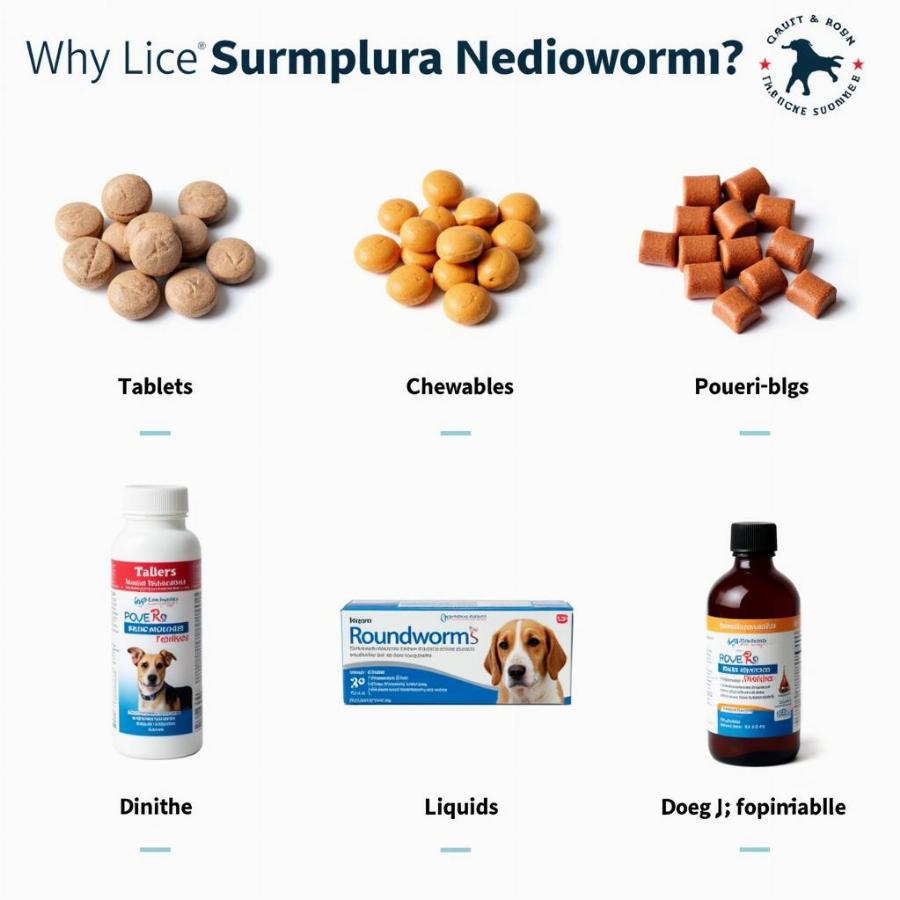Roundworm infections are a common problem in dogs, especially puppies. Understanding how to treat these parasites is crucial for maintaining your furry friend’s health. This comprehensive guide will cover everything you need to know about roundworm treatment for dogs, from identifying the signs of infection to choosing the right medication and preventing future infestations.
Recognizing the Signs of Roundworm in Dogs
How do you know if your dog has roundworms? While some dogs may not show any symptoms, others can exhibit a variety of signs, including a pot-bellied appearance, vomiting, diarrhea, weight loss, a dull coat, and coughing. Puppies, in particular, are susceptible to roundworms and can become severely ill. You might even see the worms themselves in their stool or vomit – they look like thin, white strands, resembling spaghetti. If you notice any of these signs, it’s crucial to consult your veterinarian for a proper diagnosis and treatment plan.
Choosing the Right Roundworm Treatment for Your Dog
 Types of roundworm medication for dogs
Types of roundworm medication for dogs
Several effective medications are available to treat roundworms in dogs. These medications, known as anthelmintics, work by paralyzing or killing the worms. Your veterinarian will recommend the most appropriate medication based on your dog’s age, weight, and overall health. Some common types of roundworm treatments include pyrantel pamoate, fenbendazole, and milbemycin oxime. These are available in various forms, such as tablets, chewables, and liquids, making administration easier. Remember, never self-treat your dog. Always consult your veterinarian for the correct dosage and treatment duration.
Understanding the Importance of Follow-up Care
After the initial treatment, your veterinarian might recommend a follow-up fecal examination to ensure the infection has been completely cleared. This is especially important in cases of heavy infestations. They may also advise repeat treatments at specific intervals to prevent re-infection. Following your veterinarian’s instructions carefully is essential for the successful eradication of roundworms.
Preventing Roundworm Infections in Dogs
Prevention is always better than cure. Several measures can be taken to prevent roundworm infections in dogs. Regular fecal examinations are essential for early detection and prompt treatment. Maintaining good hygiene practices, such as regularly cleaning up your dog’s feces, can significantly reduce the risk of infection. Preventing your dog from eating rodents or scavenging in contaminated areas is also crucial. worms symptoms in dogs can be varied, so regular check-ups are important. Furthermore, some heartworm preventatives also protect against roundworms, providing added protection. Discuss these options with your veterinarian to determine the best preventative strategy for your dog. best wormer for dogs can be discussed with your vet.
Conclusion
Roundworm infections are a common but treatable problem in dogs. By understanding the signs, treatment options, and preventative measures, you can help keep your canine companion healthy and free from these parasites. Remember to always consult with your veterinarian for accurate diagnosis and personalized treatment recommendations. causes diarrhea in dogs can be parasitic, so be sure to address any digestive issues with your vet. Prompt diagnosis and treatment are vital for your dog’s well-being.
FAQ
- How often should I deworm my dog for roundworms? This depends on your dog’s age, lifestyle, and risk factors. Your veterinarian can recommend the appropriate deworming schedule.
- Can humans get roundworms from dogs? Yes, although rare, humans can contract roundworms from dogs through contact with contaminated feces. Practicing good hygiene is essential.
- Are there any home remedies for roundworms in dogs? While some home remedies are touted, it’s crucial to consult with a veterinarian for safe and effective treatment. dog jelly poop may be a sign of parasites, so consult your vet.
- How long does it take for roundworm treatment to work? Most medications will kill the adult worms within a few days, but repeat treatments may be necessary to eliminate all life stages.
- Can roundworms cause serious health problems in dogs? Yes, especially in puppies. Heavy infestations can lead to intestinal blockage, malnutrition, and even death.
- What if my dog vomits after taking roundworm medication? Contact your veterinarian immediately for advice.
- How can I tell if the roundworm treatment is working? Your veterinarian will likely recommend a follow-up fecal examination to confirm the effectiveness of the treatment. why dogs have diarrhea can have various reasons, including worms.
Beaut Dogs is your trusted source for all things related to dog care. We are committed to providing valuable information to help you keep your canine companion happy and healthy. For personalized advice and assistance, contact us at Email: [email protected]. Beaut Dogs, https://beautdogs.com, is here to support you and your furry friend.